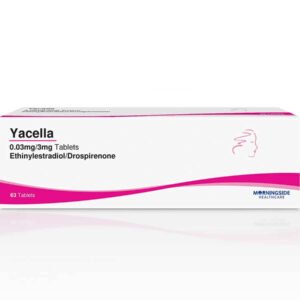What is levest?
How does it work?
The levest contraceptive pill works by stopping sperm from reaching the egg (a process known as fertilization).
The hormones in the pill do not allow ovulation to occur. If there is no ovulation, there will be no egg that the sperm can fertilize and so pregnancy does not occur.
Also, the hormones in the birth control pill make the mucus from your cervix (the lower part of your uterus) thicken and block the sperm from reaching the egg, like a security guard who doesn’t let anything pass.
What are the benefits of taking it?
How do I use it and its dosage?
Levest tablets should be swallowed whole, without chewing or crushing them. You can take your Levest tablet with or without water or food.
You should take one Levest tablet per day, every day at approximately the same time (for example, just before bed) for 21 days in a row. After 21 days of taking the pill, you will have a 7-day break period during which you will not take pills. On this break, you will generally experience ‘withdrawal’ bleeding that acts in the same way as your natural monthly period.
You should always follow the dosing instructions given by your pharmacist, nurse, or doctor who prescribed you. Otherwise, the following dose is applied:
Each Levest tablet pack contains 21 pills, with each pill marked with the corresponding day of the week on the foil strip. If you start your pack on a Monday, you will press your first tablet through the blister foil marked ‘MON’ and it will continue on the usual days of the week following the arrow. Please note that product packaging may differ from the image above.
If this is the first hormonal contraceptive you have used in the past month, you should take your first Levest pill on the first day of your menstrual cycle, that is, the first day of your usual menstrual bleeding.
Side effects & precautions
Like all medicines, the use of Levest can have some side effects. You should weigh the potential risks and benefits of using Levest with your doctor before starting treatment.
The most common side effect of using Levest is a headache. About 17-24% of all women using this pill will have headaches.
Common side effects (affects less than 1 in 100 users):
- sickness
- breakthrough bleeding or ‘spotting’
- pain in the abdomen
- weight gain
- mood swings, depression, anxiety
- tender or sore breasts
- skin rash
There are very rare cases of vascular disorders or thrombosis in users of combined contraceptive pills.
See a doctor immediately if you experience:
- signs of an allergic reaction (itchy rash, swelling of the lips, tongue or face)
- signs of venous or arterial embolism (swelling and/or pain in one leg; sudden and extreme pain in the chest, perhaps reaching the left arm; difficulty breathing; cough; difficulty speaking; seizures; fainting or collapse; loss of vision)
The following have no known frequency due to the available data
- Reduced number of platelets in the blood leading to an increased risk of bruising or bleeding, blood disorders, which can lead to an increased risk of infection.
- Swelling of the face or tongue, shortness of breath, or difficulty breathing, often with a skin rash (this can be a serious allergic reaction).
- Excess water intake (known as SIADH).
- Decreased blood sodium levels.
- Suicidal ideation and suicidal behavior; Cases of suicidal ideation and behavior have been reported during or shortly after treatment with venlafaxine (see section 2. Before you start taking Levest retard)
- Disorientation and confusion often accompanied by hallucinations (delirium), aggression
- A high temperature with stiff muscles, confusion or agitation, and sweating; or if you experience jerky muscle movements that you cannot control, these may be symptoms of serious conditions known as a neuroleptic malignant syndrome; euphoric sensations, drowsiness, rapid sustained eye movement, clumsiness, restlessness, feeling drunk, sweating, or stiff muscles, which are symptoms of serotonin syndrome, stiffness, spasms, and involuntary muscle movements
- Severe eye pain and reduced or blurred vision.
- Vertigo
- Decreased blood pressure, abnormal, fast or irregular heartbeat, which can lead to fainting, unexpected bleeding, for example bleeding from the gums, blood in the stool or vomit, or the appearance of unexpected bruising or broken blood vessels ( broken veins)
- Cough, shortness of breath, shortness of breath, and high temperature, which are symptoms of inflammation of the lungs associated with an increase in white blood cells (pulmonary eosinophilia)
- Severe back or abdominal pain (which may indicate a serious problem with the intestine, liver, or pancreas)
- Itchy, yellow eyes or skin, dark urine, flu-like symptoms, which are symptoms of inflammation of the liver (hepatitis), slight changes in blood levels of liver enzymes.
- Skin rash that can lead to severe skin blisters and peeling, itching, mild skin rash
- Unexplained muscle pain, discomfort, or weakness (rhabdomyolysis)
- Abnormal production of breast milk.
Warnings and precautions
Avoid using Levest if you have or have had any of the following in the past: a blood clot; a heart attack or stroke; angina pectoris; any disease that can increase the risk of a blood clot, or inhibit blood clotting; migraine with aura; inflammation of the pancreas; liver disease; breast cancer or cancer of the genital organs; unexplained bleeding from the vagina.
Other conditions that may also make using this medicine unsafe include liver or gallbladder disease; diabetes; depression; Crohn’s disease or ulcerative colitis; HUS (hemolytic uremic syndrome); epilepsy; systemic lupus erythematosus; high blood pressure; or high cholesterol.






